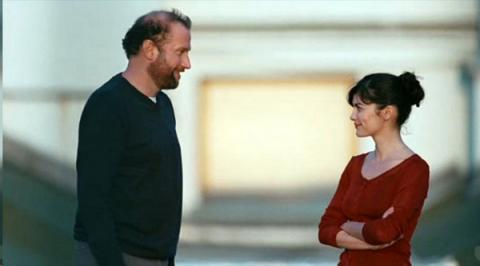‘Delicacy’, the Foenkinos’ Debut Feature Film, Is Largely Forgettable Despite Its Occasional Charms

“Delicacy” is the first feature film of brothers Stéphane and David Foenkinos. The film seems to have been made by rather inexperienced directors. It flows from sentimentality to light comedy to tragedy in a way that is neither credible nor smooth. Its humor and gushiness would have been more appropriate for separate episodes of a longer soap opera than for a single film. This kind of movie is most entertaining in an airplane or in a situation when only parts of the film are given a cursory glance. The work as a whole is guided only by its parts. Other than the strong performance of actor François Damiens, “Delicacy” consists of a compilation of movie clichés, somewhat similar to “Valentine’s Day” and “Love Actually,” but without the large entertaining ensemble cast.
The star of “Delicacy” is Audrey Tatou, who is most famous for her role as Amélie. Millions of viewers were drawn in by Tatou’s enchanting cuteness in the international art-house hit “The Fabulous Destiny of Amélie Poulain.” “Delicacy” attempts to take advantage of this same quality. Tatou plays a character named Nathalie, who is continuously celebrated by the other characters as nice, beautiful and the epitome of modern feminine perfection. Unfortunately, Tatou lacks the appeal the role imagines for Nathalie. Tatou’s face now has a severity to it, and her movements are rigid. She does not have the warmth and range of human reactions necessary to draw in viewers and gain sympathy as a heroine. She also lacks chemistry with the male actors. A film without the solid backbone of a logically unfolding plot sometimes survives on the skill of a single actress alone (for exampl, Meryl Streep in “Iron Lady”), but in “Delicacy,” this is not the case.
The first quarter of the movie consists of what could have been developed into an hour and a half of a romantic comedy, but reduced to a threadbare minimum of 25 minutes. Nathalie sits in a typical Parisian café, when a handsome guy a few tables away secretly sets his heart on marrying her. As Nathalie walks out of the café, François takes her by the shoulder and kisses her passionately. (It is worth noting that all relationships in this film begin in the same way – with a character coming up to a stranger and spontaneously kissing him/her on the lips).
The Foenkinos brothers then show Nathalie and Francois date, and they get along perfectly – since Francois is, after all, Mr. Perfect, and, according to the film, Nathalie comes pretty close to perfection herself. Francois proposes to Nathalie in the rain, getting down on one knee and putting his keychain around her finger. A few minutes after we see the two meet, they are already married and talking about having kids. Parallel to this, Nathalie’s work life develops as unexpectedly as her personal life does. From a girl who sells programs at a theatre, Nathalie is hired for an undefined, prestigious executive position in a large Swiss corporation.
The romantic comedy suddenly ends with a jolt and is replaced with sentimental tragedy when François is killed in an accident. The now-widowed Nathalie grieves and distances herself from everything and everyone. She becomes a workaholic and does not date anyone for years. Her married boss attempts to begin an affair with her, but to no avail. The film drags on and seems to be beyond redemption, when suddenly her hulking, disheveled Swedish co-worker Markus (Damiens) appears in her office, and the best part of the film begins. (What went on before turns out to be an overextended setup). François Damiens brings warmth, spontaneity, charm and a breathof fresh air to the film. He is a good comedic actor and picks up some of the subtleties that Tatou is unable to grasp here. His awkward courtship of Nathalie is funny and endearing.
Despite the goofy moments Markus manages to create, it is still jarring that the plot of “Delicacy” develops illogically from beginning to end. Some romantic comedies get away with this; they are so pleasant that their lack of realism is welcome. The main problem here is not that the film is unrealistic, but that it is not absorbing enough to pull off the unrealism. Even its feel-good ending is framed in a way that is underwhelming. It seems that the film attempts to get across that people can become attracted to their opposites, and that the main thing that stops them from being happy with one another is simply their own insecurities But it does not live up to its intention. The final product is a shallow odd-couple romance which makes for an easily forgettable movie.
Author Bio:
Elizabeth Pyjov is a contributing writer at Highbrow Magazine.





























































































































































































































































































































